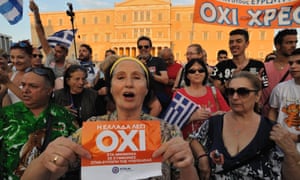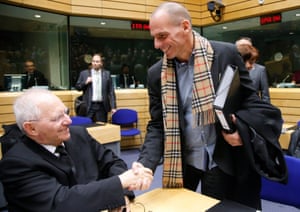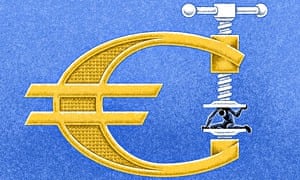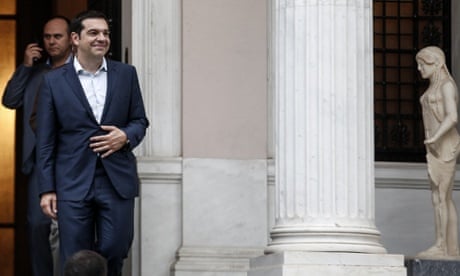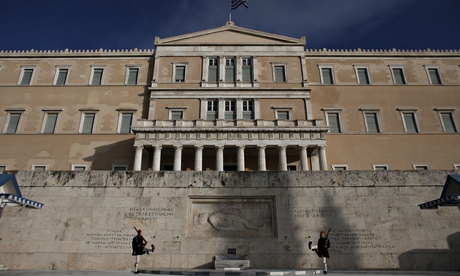Katie Allen in The Observer
Leaving or remaining in the union is about politics, history and much more. Yet we keep on consulting economists.
The government’s £9m publicity drive will no doubt quote economists’ views on what Brexit could mean. But should it? Photograph: Dan Kitwood/PA
Households in England can look forward to a 14-page booklet landing on their doormat this week, making the case for Britain’s remaining in the EU. Responding to criticism of the £9m publicity drive, which will eventually reach the whole of the UK, the government said a survey had shown that 85% of people wanted more facts about the referendum.
If it is facts we get, fair enough. Voters are being asked to decide on something that until recently they knew little about, and probably cared even less. Now, with less than three months to go to the poll, it’s little surprise people want a crash course in the pros and cons of EU membership. Understandably, many simply want to know whether they will be better or worse off if we leave.
And that’s where the “dismal science” steps in. But should it? Economics is seen as a great simplifier, and we all love simplicity when faced with a decision. Wouldn’t it be nice if economists could plug some numbers into a spreadsheet and come out with a cold, hard figure: how much Brexit might cost, or benefit, the UK?
Plenty of economists have tried, and their calculations have been lapped up by the media and campaigners alike.
Analysts at investment bank Credit Suisse say a vote to leave the EU would trigger a snap UK recession, prompt a fall in share prices and house prices and knock as much as 2% off GDP.
BlackRock, the world’s largest fund manager, has warned about potential losses to the exchequer if the financial industry is depleted by Brexit. If 10% of workers in financial services lost their jobs after a vote to leave, it says, the government could lose up to £3bn in annual employment taxes.
The CBI has gone further, seeking to pinpoint what each household would lose. Analysis it commissioned from accountant PricewaterhouseCoopers claimed that Brexit would cause a serious shock to the UK economy that could lead to 950,000 job losses and leave the average household as much as £3,700 worse off by 2020.
PwC examined two exit scenarios: one at the optimistic end of the range, and the other assuming difficult trade negotiations that eventually result in trade deals being concluded. It also said that much more pessimistic scenarios could be envisaged.
And therein lies the problem. No accountant or economist can tell voters what trade deals would be negotiated in the event of a vote to leave. Nor can they tell us what immigration rules will be hammered out, which international firms will leave Britain or how UK government bonds will fare on international markets.
Economists themselves would probably admit as much, given the chance. After all, devotees of this discipline are passionate about probability distribution tables and many-hued fan charts that map out potential outcomes. Robert Chote, chair of the government’s forecaster, the Office for Budget Responsibility, has in the past used a fan chart in tones of red and orange to show likely it thought the government was to meet its fiscal rule: Chote called it “the flamethrower of uncertainty”.
Harry Truman famously summed up his frustrations with wishy-washy advisers when he reportedly exclaimed: “Give me a one-handed economist. All my economists say, ‘on the one hand … on the other’.”
Yet still we turn to economists for answers, making oracles of people who can’t even agree on what the UK’s trend rate of growth is, who can’t predict what inflation will be from one month to the next – and who largely failed to predict the biggest financial crisis in living memory. Much as voters and politicians would like economics to be an objective way of quantifying the effects of staying in or leaving the EU, it is not.
There is a second problem with taking a purely economic approach to the Brexit debate: it tends to focus on the short term. But if people really believe the UK should not, for whatever reason, be part of the EU, they should accept some short-term disruption from a decision to leave.
Similarly, those who want to stay but worry about how much the UK pays to Brussels must accept that being part of the EU comes at a price. The decision cannot be based merely on near-term profit or loss.
Take the example of German reunification in 1990. Marrying two countries with vastly different productivity levels, work cultures and politics made little economic sense. The same went for the one-for-one exchange rate for ostmarks and deutschmarks. But it wasn’t about the economics – reunification was about history and politics. As former chancellor Willy Brandt put it: “What belongs together, will grow together.” More than a quarter of a century down the line, Germany is still growing together, the economies of east and west still struggling to run to the same rhythm. But that does not make reunification a mistake.
One thing that Remain campaigners are right about is that leaving the EU would be a “leap in the dark”. Or as Airbus executives told staff in a letter warning against Brexit: “We simply don’t know what ‘out’ looks like.”
No country has ever left the bloc. That puts the onus on Leave campaigners to come up with more than reassurances that it will all be OK. But those on the other side do themselves and the dismal science few favours by bandying around flaky figures.
Households in England can look forward to a 14-page booklet landing on their doormat this week, making the case for Britain’s remaining in the EU. Responding to criticism of the £9m publicity drive, which will eventually reach the whole of the UK, the government said a survey had shown that 85% of people wanted more facts about the referendum.
If it is facts we get, fair enough. Voters are being asked to decide on something that until recently they knew little about, and probably cared even less. Now, with less than three months to go to the poll, it’s little surprise people want a crash course in the pros and cons of EU membership. Understandably, many simply want to know whether they will be better or worse off if we leave.
And that’s where the “dismal science” steps in. But should it? Economics is seen as a great simplifier, and we all love simplicity when faced with a decision. Wouldn’t it be nice if economists could plug some numbers into a spreadsheet and come out with a cold, hard figure: how much Brexit might cost, or benefit, the UK?
Plenty of economists have tried, and their calculations have been lapped up by the media and campaigners alike.
Analysts at investment bank Credit Suisse say a vote to leave the EU would trigger a snap UK recession, prompt a fall in share prices and house prices and knock as much as 2% off GDP.
BlackRock, the world’s largest fund manager, has warned about potential losses to the exchequer if the financial industry is depleted by Brexit. If 10% of workers in financial services lost their jobs after a vote to leave, it says, the government could lose up to £3bn in annual employment taxes.
The CBI has gone further, seeking to pinpoint what each household would lose. Analysis it commissioned from accountant PricewaterhouseCoopers claimed that Brexit would cause a serious shock to the UK economy that could lead to 950,000 job losses and leave the average household as much as £3,700 worse off by 2020.
PwC examined two exit scenarios: one at the optimistic end of the range, and the other assuming difficult trade negotiations that eventually result in trade deals being concluded. It also said that much more pessimistic scenarios could be envisaged.
And therein lies the problem. No accountant or economist can tell voters what trade deals would be negotiated in the event of a vote to leave. Nor can they tell us what immigration rules will be hammered out, which international firms will leave Britain or how UK government bonds will fare on international markets.
Economists themselves would probably admit as much, given the chance. After all, devotees of this discipline are passionate about probability distribution tables and many-hued fan charts that map out potential outcomes. Robert Chote, chair of the government’s forecaster, the Office for Budget Responsibility, has in the past used a fan chart in tones of red and orange to show likely it thought the government was to meet its fiscal rule: Chote called it “the flamethrower of uncertainty”.
Harry Truman famously summed up his frustrations with wishy-washy advisers when he reportedly exclaimed: “Give me a one-handed economist. All my economists say, ‘on the one hand … on the other’.”
Yet still we turn to economists for answers, making oracles of people who can’t even agree on what the UK’s trend rate of growth is, who can’t predict what inflation will be from one month to the next – and who largely failed to predict the biggest financial crisis in living memory. Much as voters and politicians would like economics to be an objective way of quantifying the effects of staying in or leaving the EU, it is not.
There is a second problem with taking a purely economic approach to the Brexit debate: it tends to focus on the short term. But if people really believe the UK should not, for whatever reason, be part of the EU, they should accept some short-term disruption from a decision to leave.
Similarly, those who want to stay but worry about how much the UK pays to Brussels must accept that being part of the EU comes at a price. The decision cannot be based merely on near-term profit or loss.
Take the example of German reunification in 1990. Marrying two countries with vastly different productivity levels, work cultures and politics made little economic sense. The same went for the one-for-one exchange rate for ostmarks and deutschmarks. But it wasn’t about the economics – reunification was about history and politics. As former chancellor Willy Brandt put it: “What belongs together, will grow together.” More than a quarter of a century down the line, Germany is still growing together, the economies of east and west still struggling to run to the same rhythm. But that does not make reunification a mistake.
One thing that Remain campaigners are right about is that leaving the EU would be a “leap in the dark”. Or as Airbus executives told staff in a letter warning against Brexit: “We simply don’t know what ‘out’ looks like.”
No country has ever left the bloc. That puts the onus on Leave campaigners to come up with more than reassurances that it will all be OK. But those on the other side do themselves and the dismal science few favours by bandying around flaky figures.


